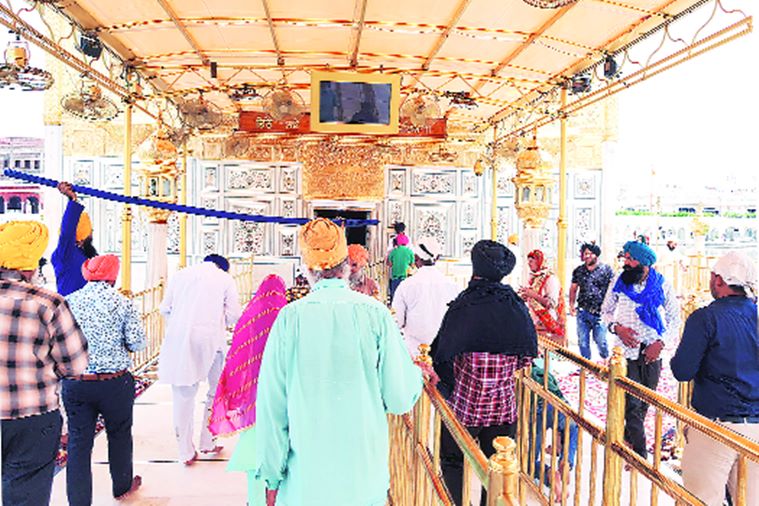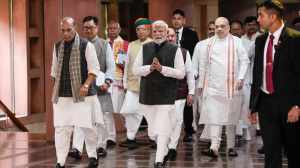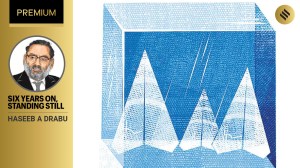At Golden Temple, no bar on ‘langar’, ‘prasad’; many devotees sans masks
"On the first day of official opening of religious places, the number of devotees increased to 30 to 40 per cent," said a medical officer who was responsible for keeping a check on devotees entering the Golden Temple.
 Rush of devotees at Golden Temple in Amritsar on Monday. (Rana Simranjit Singh)
Rush of devotees at Golden Temple in Amritsar on Monday. (Rana Simranjit Singh)
AS RELIGIOUS places officially reopened on Monday, the Golden Temple in Amritsar, which has remained open throughout the lockdown, continued its ‘langar’ and distribution of ‘prasad’ among devotees, defying the Punjab government’s Covid guidelines.
Shiromani Gurdwara Parbandhak Committee (SGPC) authorities said they ensured complete hygiene at the community kitchen centre.
Against the Punjab government’s instructions, the number of devotees at any time of the day inside the temple remained more than 20 Monday. The government had also issued instructions against the offering of ‘prasad’ and community kitchen at all religious places.
“On the first day of official opening of religious places, the number of devotees increased to 30 to 40 per cent,” said a medical officer who was responsible for keeping a check on devotees entering the Golden Temple.
A health department team was deployed at the temple as soon as the lockdown was imposed in India in the last week of March. Though devotee numbers dropped considerably after lockdown was imposed, the temple and its community kitchen was never closed.
A protocol was set by the health department and SGPC for devotees during their stay inside the premises to avoid the spread of infection. The same protocol is being followed after official opening of religious places to keep hands of devotees sanitised and maintain social distancing inside the premises.
“Most devotees were not wearing masks inside premises. At the entrance, we asked the devotees to wear masks. But many would remove them inside,” said the medical officer.
Devotees often take a dip in the holy pond after entering the Golden Temple and it is here that they remove their masks and either forget or avoid wearing them again.
“If restaurants and hotels can sell food, why is hygienically prepared holy prasad not allowed in gurdwaras by the government?” asked SGPC member Kiranjot Kaur.
SGPC president Gobind Singh Longowal had on Sunday urged the government to review its guidelines prohibiting the offering of ‘prasad’ and ‘langar’ (community kitchen). “Offering ‘karah parsad’ and ‘langar’ is part of code of conduct. Every Sikh wants prasad after visiting any gurdwara. Prohibiting both the services isn’t a good decision,” said Longowal in his statement.
The administration never pressurised SGPC to halt religious activities at the Golden Temple, hence devotees kept coming throughout the curfew and lockdown. Police stepped up to stop devotees from entering the Golden Temple only on June 6, on the day of the Operation Blue Star anniversary.
“Sometimes it is not possible to impose some government instructions on ground. So we would like SGPC to follow all instructions. But we can only push SGPC to a limit,” said an official of the district administration.
“We offered prasad and community kitchen even during peak days of lockdown and curfew. Officially we haven’t received any instructions to not offer prasad and community kitchen from the government. We have read it only in media,” said an SGPC spokesperson.
SGPC secretary Kulwinder Singh said, “It is very strange that during the lockdown period, governments were urging religious institutions including SGPC to come forward to make available food for the needy people. SGPC then did not discontinue ‘Guru Ka Langar’. Now religious shrines have opened for the public. In such circumstances, how SGPC could stop its several decades old religious tradition of serving food whosoever visits here. SGPC will never shut down its community kitchen, since it is a round the clock service for visiting devotees.”
At the Golden Temple, devotees underwent thermal screening before entering the shrine. Various teams of doctors were deputed at the entry points of the shrine, officials said.
Never interfered with religious matters: Capt
Chief Minioster Amarinder Singh Monday said the decision barring the distribution of ‘prasad’ at religious places was taken by the Union government, of which the SAD was an integral part. The CM said his government had never believed in interfering with the customs and practices of any religion but was ‘constrained by the guidelines of the Union Ministry of Home Affairs’.
His statement came after the Golden Temple restarted its ‘langar’ and distributed ‘prasad’ among devotees as it reopened on Monday, defying the Punjab government’s lockdown guidelines.
“How could the state government be held responsible for prohibiting ‘prasad’ distribution at gurdwaras or other places of worship when the Union Ministry of Health and Family Welfare had issued the standard operating procedure (SOPs) to be followed by religious places under the directives of the Union Ministry of Home Affairs,” asked the CM.
It was the MHA that had taken the decision under the National Disaster Act to allow opening of religious places from June 8 and had subsequently asked the various central ministries to issue necessary guidelines for the same, Singh said in the statement.
As a union minister, SAD leader Harsimrat Kaur Badal and her party must surely have been consulted before the issuance of the SOPs on the reopening of religious places with effect from June 8, Amarinder said. Harsimrat should have put her foot down then and insisted on allowing the distribution of ‘prasad’, instead of protesting later and wrongly putting the blame on the state government, he added.
In fact, said the CM, he had already directed the state’s additional chief secretary (home) to issue instructions for ‘langar’ in conformity with the guidelines issued by the Government of India at the gurdwaras. He himself will be writing to the prime minister to allow the distribution of ‘prasad’ in religious places, he added.
The CM lashed out at the “brazen double standards” of the Akalis, who, according to him, were in the “habit of supporting controversial decisions of the Government of India while making the pretension of opposing the same in public”. From the Citizenship Amendment Act legislation to the more recent ordinance on agricultural reforms, the Akali leaders, particularly Harsimrat, had been repeatedly trying to “fool” the people of Punjab with their blatant lies, he said.
The CM urged the Akali leader to stop playing “petty politics” in these exigent times, which required collective efforts by all, across political dispensations, to battle the crisis.
WITH PTI












